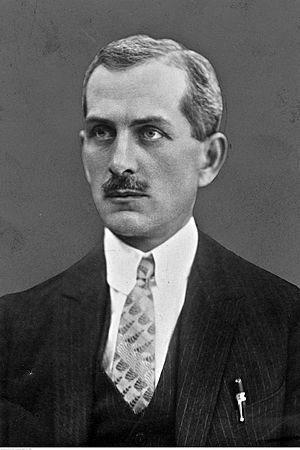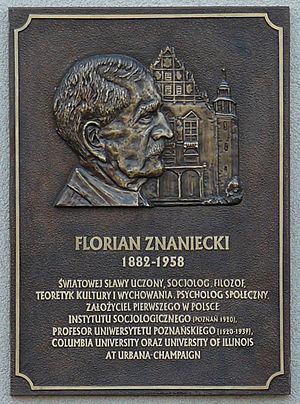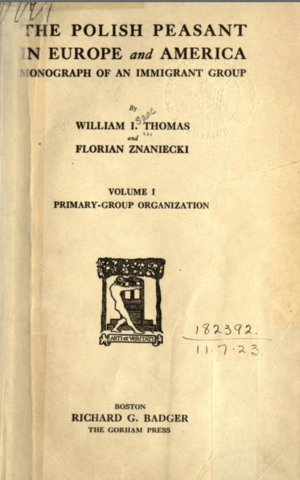Florian Znaniecki facts for kids
Quick facts for kids
Florian Znaniecki
|
|
|---|---|
 |
|
| Born | 15 January 1882 Świątniki, Congress Poland
|
| Died | 23 March 1958 (aged 76) |
| Nationality | Polish, later American |
| Alma mater | Jagiellonian University (Kraków) |
| Known for | Contributions to logology The Polish Peasant in Europe and America humanistic coefficient culturalism |
| Scientific career | |
| Fields | Sociology |
| Institutions | Adam Mickiewicz University (Poznań), Columbia University, University of Illinois at Urbana-Champaign |
| Influences | William I. Thomas, Georg Simmel, Robert E. Park, Émile Durkheim |
Florian Witold Znaniecki (born January 15, 1882 – died March 23, 1958) was an important Polish-American thinker. He started as a philosopher and later became a leading sociologist. A sociologist studies how people live together in groups and societies.
Znaniecki taught and wrote in both Poland and the United States. He is seen as a key figure in Polish and American sociology. He even started the first university sociology department in Poland.
He became famous around the world for his book, The Polish Peasant in Europe and America (1918–1920). He wrote this book with William I. Thomas. This work is considered the start of modern empirical sociology, which means studying society using real-world facts and observations.
Znaniecki also created important ideas in sociology, like the "humanistic coefficient" and "culturalism". These ideas helped shape how sociologists understand human behavior and culture.
In Poland, he worked at Adam Mickiewicz University in Poznań from 1920 to 1939. In the US, he taught at the University of Chicago, Columbia University, and the University of Illinois at Urbana-Champaign. He was even the president of the American Sociological Association in 1954.
Contents
Life Story
Early Years and School
Florian Znaniecki was born on January 15, 1882, in a place called Świątniki in Congress Poland. At that time, this part of Poland was controlled by the Russian Empire.
He was taught at home by tutors when he was young. Later, he went to high schools in Warsaw and Częstochowa. While in high school, he joined a secret study group. This group focused on history, literature, and philosophy. This was because Polish-language studies were banned by the Russian rulers.
In 1902, he started at the Imperial University of Warsaw. But he was soon kicked out for protesting against the Russian government. To avoid being forced into the Russian army, he left Poland in 1904.
He traveled a lot in Europe. He worked as an editor for a magazine, served in the French Foreign Legion for a short time, and worked odd jobs. He also studied at universities in Switzerland and France. In Paris, he attended lectures by the famous sociologist Émile Durkheim.
In 1909, he returned to Poland. In 1910, he earned his PhD degree from Jagiellonian University in Kraków.
Starting His Career in Poland
After getting his PhD, Znaniecki joined the Polish Psychological Society. He was very active there and became its vice president. His early work was mostly about philosophy. He wrote about ethics, values, and how humans understand the world.
Because of his past protests, it was hard for him to get a job at a big university. So, from 1912 to 1914, he taught at a special school for women.
He also worked with Polish immigrants. He became the director of the Society for the Welfare of Émigrés. He even wrote a big report for the government about seasonal migration. This made him an expert on Poles moving to other countries.
Working with William I. Thomas
In 1913, Znaniecki met William I. Thomas, an American sociologist. Thomas was in Poland to research Polish immigrants in the United States. They started working together, and Thomas invited Znaniecki to come to Chicago.
In July 1914, just before World War I began, Znaniecki moved to the US. He worked with Thomas as a research assistant. He also taught sociology at the University of Chicago from 1917 to 1919.
Their most famous work together was The Polish Peasant in Europe and America. This five-volume book is a classic in sociology. It helped Znaniecki change his focus from philosophy to sociology. He stayed in Chicago until 1919, then moved to New York with Thomas.
In New York, they continued their research on how immigrants become American. Znaniecki helped with Thomas's book, Old World Traits Transplanted.
Building Polish Sociology

After World War I, Poland became an independent country again in 1918. In 1919, Znaniecki offered to return to Poland if he could get a university job. He wanted to create a new Institute of Sociology.
In 1920, Znaniecki went back to Poland. At Adam Mickiewicz University in Poznań, he became Poland's first professor of sociology. He changed the name of his department to "Department of Sociology and Cultural Philosophy." He also started a Sociological Seminary.
That same year, he founded the Polish Institute of Sociology. This was one of the first sociology institutes in Europe. In 1927, his department was officially named "department of sociology." In 1930, it could give out degrees in sociology.
The Polish Institute of Sociology also started the first Polish sociology journal, Przegląd Socjologiczny. Znaniecki was its main editor. He is known as one of the founders of sociology in Poland.
Later Career in the U.S.
Znaniecki kept in touch with American sociologists. He taught as a visiting professor at Columbia University in New York City in 1932–34 and again in the summer of 1939.
That summer, World War II began with the German invasion of Poland. This stopped him from returning home. He was on a ship going to Poland when he had to stop in the United Kingdom. He thought about going back to Poland, where his wife and daughter were. But because Poland was occupied, he returned to the United States in 1940. His family later joined him after being held in a Nazi camp.
With help from friends, Znaniecki got a job at the University of Illinois at Urbana-Champaign. In 1942, he became an American citizen. This allowed him to become a regular professor. He taught there until he retired in 1950. He chose not to go back to communist Poland, even though he was offered a job. After retiring, he became a professor emeritus.
He was the 44th President of the American Sociological Association in 1954. He gave a speech called "Basic Problems of Contemporary Sociology."
Florian Znaniecki passed away on March 23, 1958, in Champaign, Illinois. He was buried at Roselawn Champaign Cemetery.
Family Life
In 1906, Znaniecki married Emilia Szwejkowska, a Polish student. They had a son named Juliusz Znaniecki, who became a poet and writer. Emilia died in 1915.
The next year, Znaniecki married Eileen Markley. They had a daughter, Helena Znaniecki Lopata, who also became a sociologist.
Why Znaniecki Was Important
Florian Znaniecki made huge contributions to sociology. He is known for:
- Starting sociology as a field of study in Poland.
- His work in empirical sociology, which means studying society using real-world facts.
- His ideas in sociological theory, which are frameworks for understanding society.
He tried to connect different ideas in sociology. He wanted to link real-world studies with deeper theories. He also tried to combine American and European ways of thinking.
Znaniecki's most famous work is The Polish Peasant in Europe and America. He wrote this book with William I. Thomas. Other important books include The Method of Sociology (1934) and Cultural Sciences (1952).
Key Ideas and Themes
Studying Society with Facts
Znaniecki's work in empirical sociology was greatly shaped by his time with William I. Thomas. Their book, The Polish Peasant in Europe and America, looked at Polish immigrants in America. It used personal letters and documents to show how new immigrants became "Americans."
This book is Znaniecki's most important contribution to studying society with facts. Most of his other works focused on bigger ideas and theories.
What is Sociology?
Znaniecki believed that sociology is a science that is different from natural sciences. He defined sociology as the study of "social actions." Social actions are the things people do that affect others.
He suggested a method called analytic induction. This means studying specific examples or "case studies" to find general rules about how society works.
Znaniecki's ideas are a big part of "action theory" in sociology. His work also helped create "humanistic sociology." This approach focuses on understanding human experiences and meanings.
He thought that sociology should study "culture" and how people interact based on shared values and rules. He saw culture as separate from nature and from what individuals think.
Znaniecki was one of the first sociologists to use personal documents like letters, autobiographies, and diaries in his research. He believed these documents helped sociologists understand how people see the world. This was part of his "humanistic coefficient" method.
Four Ways to Look at Society
Znaniecki believed sociology could be divided into four main areas of study. These areas show how people cooperate and interact:
- Social actions: These are the most basic things people do that affect others.
- Social relations: These happen when at least two people have a connection and a shared understanding of what they should do for each other.
- Social personalities: This is the overall picture of a person based on the different roles they play in society (like being a student, a friend, or a family member).
- Social groups: This is any group of people that others see as a separate unit. Znaniecki saw society as a collection of many groups.
He first wrote about these four areas in his 1934 book, The Method of Sociology.
Sociology of Culture
Znaniecki created the term "humanistic coefficient." This is a way of doing social research that focuses on how people involved in a situation understand it. He believed that all social facts are created by people and can only be understood from their point of view.
He also introduced the idea of "culturalism." This idea suggests a third way of looking at the world, different from just focusing on ideas (idealism) or just on physical things (realism). Culturalism sees culture as a unique field of study. It was a key idea in modern sociology that disagreed with simply treating society like a natural science.
Works by Znaniecki
Znaniecki's first academic writings were more about philosophy. But starting in the 1920s, he focused mainly on sociology. His book Cultural Reality (1919) summed up his philosophical ideas. However, his more popular book, The Polish Peasant in Europe and America, made him famous as a sociologist.
His book The Method of Sociology (1934) first explained his ideas about how sociology could be divided into different areas. Two other important books published in 1952 were Modern Nationalities and Cultural Sciences. Modern Nationalities looked at how national cultures develop. Cultural Sciences explored how sociology relates to other sciences.
Znaniecki never finished his biggest work, Systematic Sociology. It was published after he died as Social Relations and Social Roles: The Unfinished Systematic Sociology (1965).
List of Works
About half of Znaniecki's published works are in English, and the rest are in Polish.
In English:
- The Polish Peasant in Europe and America (with William I. Thomas, 5 volumes, 1918–1920).
- Cultural Reality, Chicago, 1919.
- The Laws of Social Psychology, Warsaw, 1926.
- The Method of Sociology, New York, 1934.
- Social Actions, New York 1936.
- The Social Role of the Man of Knowledge, New York, 1940.
- Cultural Sciences: Their Origin and Development, Urbana, 1952.
- Modern Nationalities, Urbana, 1952.
- Social Relations and Social Roles: The Unfinished Systematic Sociology, San Francisco, 1965.
In Polish:
- Zagadnienie wartości w filozofii (The Question of Value in Philosophy), Warsaw, 1910.
- Humanizm i poznanie (Humanism and Knowledge), Warsaw, 1912.
- Wstęp do socjologii (An Introduction to Sociology), Poznań, 1922.
- Socjologia wychowania (The Sociology of Education), Warsaw (vol. I: 1928; vol. II: 1930).
- Miasto w świadomości jego obywateli (The City in the Consciousness of Its Citizens), Poznań, 1931.
See also
 In Spanish: Florian Znaniecki para niños
In Spanish: Florian Znaniecki para niños
- History of philosophy in Poland
- List of Poles in social sciences
- Sociology in Poland
 | Emma Amos |
 | Edward Mitchell Bannister |
 | Larry D. Alexander |
 | Ernie Barnes |


